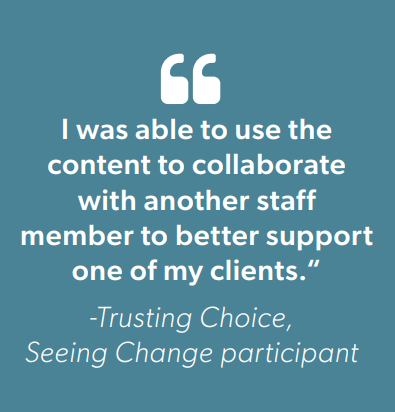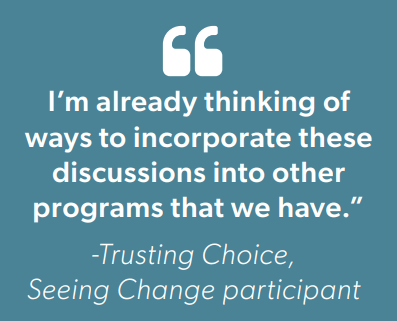Shifting Harmful Narratives About Poverty in Detroit
HIGHLIGHTS
- To address harmful poverty narratives that may hinder human service providers in Detroit, we designed a series of action-oriented activities to guide conversations and center clients and personal agency in staff work.
- Through perspective-taking exercises and relatable stories, staff members shifted their attitudes, improved staff-client interactions, and increased motivation.
- This promising, ongoing work will expand to more human service providers for a broader impact.
The Challenge
Recognizing that narratives shape our perceptions and interactions with the world, and ultimately our behavior—what positions we take on policy, how we design programs, and how we treat other people—our Economic Justice team is on a multi-year mission to examine attitudes and beliefs about poverty in the U.S.
In Detroit, we’re working with human service provider organizations such as local community centers, temporary housing shelters, health clinics, family support and developmental services to uncover and understand narratives staff members hold to design innovative and behaviorally informed tools to shift harmful narratives and support staff to counter them in their day-to-day work.
Shifting the narratives held by human service provider staff is critical in both improving staff-client interactions, and maintaining staff morale in ways that foster a more equitable and supportive social services environment. While human service providers may better understand the realities faced by people living in poverty than the average person, no one is immune to holding harmful narratives, including those experiencing poverty firsthand.
Our Approach
Since 2020, our team has collaborated with local human service provider organizations in Detroit to combat two harmful narratives: that poverty is inescapable and inevitable (fatalism) and that people living in poverty need help to make decisions for themselves (paternalism). We formed a Local Narrative Team (LNT) to center the community and its lived experiences while co-creating and testing a behaviorally informed intervention to combat narratives hindering positive staff-client interactions and general staff motivation at human service organizations.
Drawing from the expertise and insights of the LNT, the understanding we gained from interviews of the challenges service providers face, such as limited time and resources, and applying evidence from behavioral science, we developed the “Trusting Choice, Seeing Change” pilot, a series of action-oriented, guided conversations explicitly tailored for staff members at human service provider organizations.
Results
The “Trusting Choice, Seeing Change” pilot yielded promising results that prompted us to expand to a larger sample size to assess findings further. Qualitative feedback from staff members indicates a significant impact on their attitudes and behaviors. Through the intervention, staff members learned to recognize paternalism and fatalism in their workplace and personal lives, reflecting a heightened knowledge of the falseness of the harmful narratives and the importance of centering clients and personal agency in staff work.
Our analysis revealed that the treatment group, staff members who participated in the “Trusting Choice, Seeing Change” conversations, exhibited a lower endorsement of paternalism and a slightly lower endorsement of fatalism narratives compared to the control group, staff members who didn’t participate. Additionally, we observed a decrease in the approval of imposing administrative burdens in social policies and an increase in interpersonal generosity, which reflects a willingness to give, support, and be considerate of others in our interactions.


Learn more about the pilot here.
Takeaway
With a deep understanding of human behavior and an experimental toolkit, behavioral science is a field uniquely positioned to design new innovative approaches to narrative change.
By understanding and leveraging the ways behavioral principles play a role in shaping and reinforcing narratives, we seek to create tools to amplify the efforts by many organizations and disciplines working to shift harmful narratives about poverty and help advance the narrative change field. As our work continues, we hope to deepen and expand our existing relationships to find solutions that are even more durable and effective.
Interested in learning more about our work applying behavioral science to economic justice? Reach out to us at ematos@ideas42.org or on X at @ideas42 to join the conversation.



